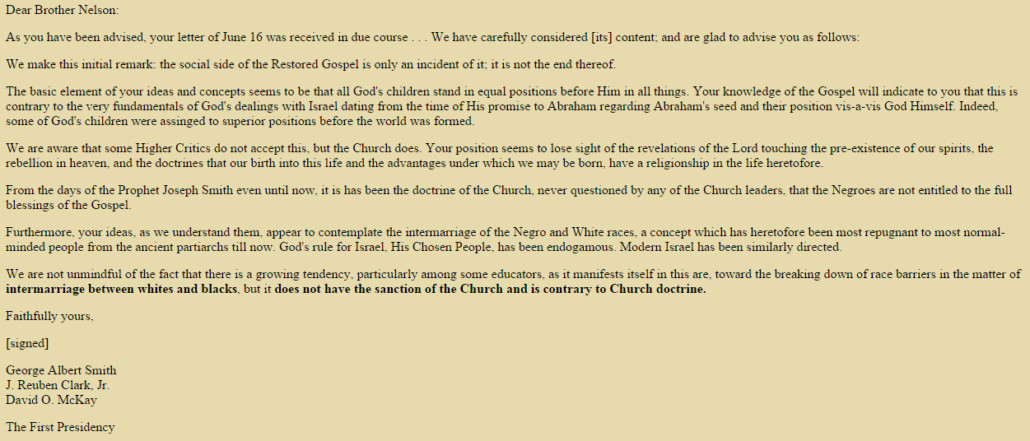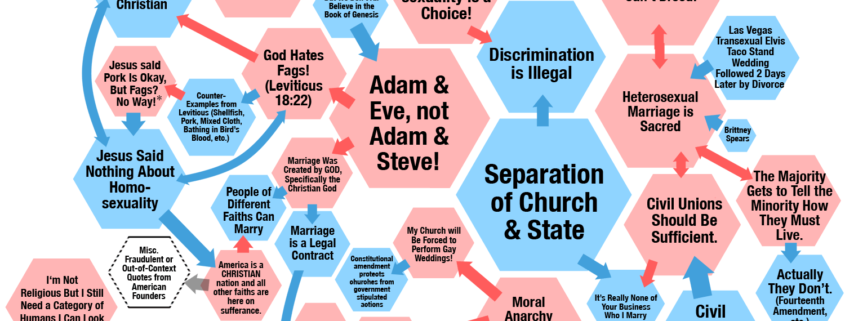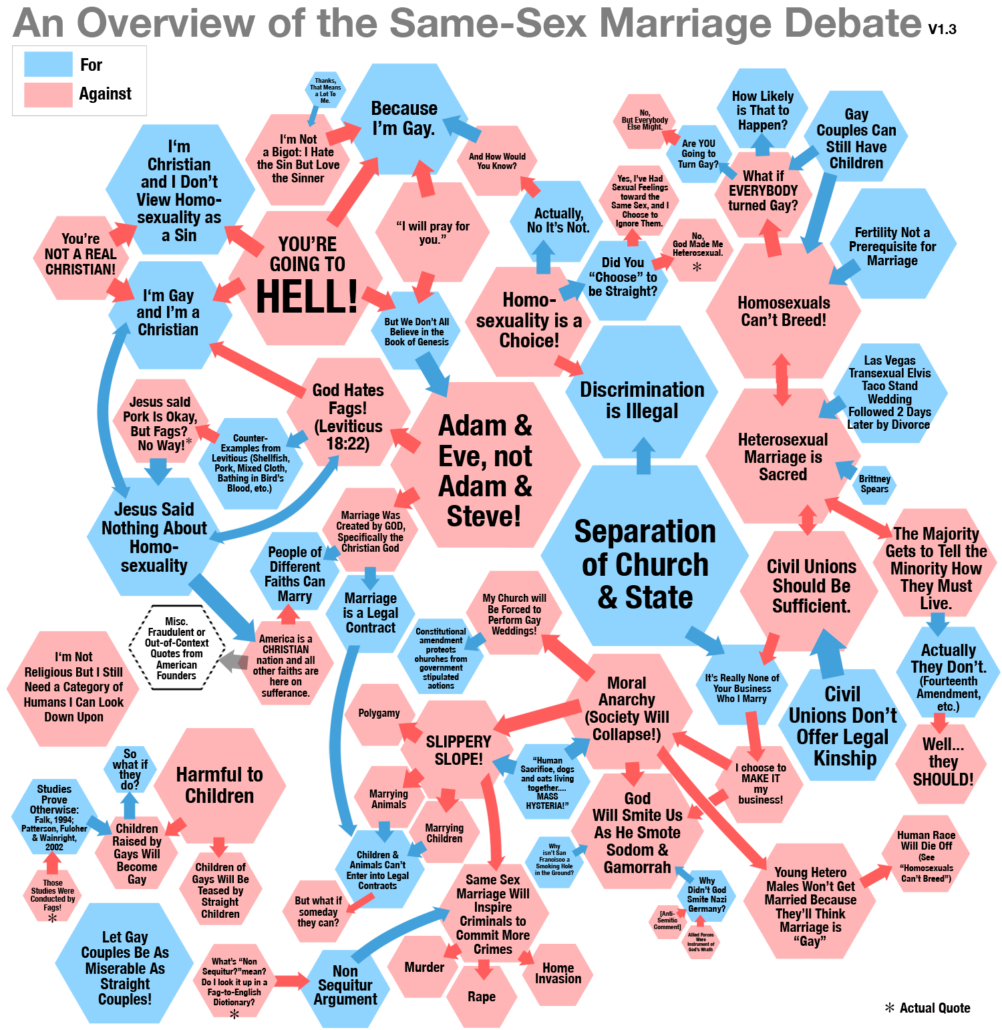Bridging the Homosexuality Divide- An LDS Perspective
Homosexuality and the church has again entered the public eye.
I’m hoping I can throw some compassion on this polarizing topic here by reminding LDS people to be loving, civil non-dogmatic, understanding and not so quick to make up excuses or use self righteous language. It might help us in this aim to remember that similar polarized arguments accompanied the 1870’s cultural issues of Mormon polygamy, slavery abolition, and the 1960’s issues of African American intermarriage and civil equality and later priesthood equality.
We should remember that because polygamy unwittingly legitimizes lesbian acts among plural wives, Mormon’s were actually the first religious and political group in America to legally sanction the redefinition of marriage to include a type of same sex couples.
And let’s always keep in mind this aspect of our history…

LDS first presidency letter and policy concerning blacks and the priesthood.
Compare this to even just the first paragraph of the Church’s new Gospel Topics essay on Race and the Priesthood, and you can see that Church policy & doctrine changes according to the needs of the times enough that we need not be dogmatic in our explanations. It’s not always readily apparent to ecclesiastical leaders what the Spirit has in store for the world or a given culture. Not that I’m advocating ignoring or opposing LDS leaders. But it does mean LDS members and leaders should be careful being too dogmatic or self righteous in our discussions about the inspiration behind church policy. It takes time for EVERYONE to find and implement the highest light. We should be careful about making up our own justifications and excuses or using “the prophet is always right” or “God said so” language. We should remember that similar policies have officially changed and been disavowed in the past–and others haven’t, and we simply don’t know what will come of this issue. So instead of being upset about it just civilly voice your favor or disfavor (and be patient with church leaders as they go through the process of figuring out whats right – something that sometimes takes decades).
Lets remember Christ’s Sermon on the Mound instead of making appeals to divisive and self-righteous scriptures like “the wheat and the tares”, the “division in the last days”, Christ came to “bring a sword” or other scriptures that are constantly used to justify and defend mean-spirited behavior.
Lets remember D&C 121:41–42 where we are instructed that “no power or influence can or ought to be maintained by virtue of the priesthood, only by persuasion, by long suffering, by gentleness and meekness, and by love unfeigned; By kindness and pure knowledge…” That means using persuasion through christ-like attributes instead of appealing to religious priesthood authority such as saying “follow the church leaders because their inspired positions”, or “I know we’re right because we have a prophet!”. Such arguments only come across as self-righteous and consequently breed division and apostasy (such as the above brash quote by the First Presidency suggesting Church policy on Blacks and the Priesthood would never change).
—-
Instead, we can use gentleness and love to start by apologizing to those who are hurt, and acknowledging any part we might play in that hurt. We can use reason to explain that church policies change according to what the church seems to need or is ready for at the moment, so society and members should be patient with each other as we feel our way through these new issues of civil rights.
Regardless of what happens we should be empathetic and understanding. We should remember the advice of Scott H. Swofford and fellow LDS researchers in starting the “I’m a Mormon Campaign who found that to dispel cultural bigotry against Mormons,
“that the most powerful myth-dispelling force was personal exposure to the lives of members”. They learned that “people need five to 10 exceptions in their lives before they will adjust their misconceptions…“.
In light of empathy, I think it is extremely helpful to watch the life stories of 5 to 10 homosexual individuals before deciding how best to respond to arguments surrounding the issue. Look at them as if they were your son/daughter or brother/sister (since it might someday be).
Then, and only then can we be in a position to have a Christlike discussion on how to
1- Best promote marriages which produce offspring, without demeaning or belittling those with same-sex attraction or other sterile unions.
2-How to best fulfill religion’s role to polarize those who straddle the fence or middle ground of the Kinsey Hetero-homosexual rating scale without unfairly relegating those who decidedly occupy the ends of that spectrum.
3-How to fairly give some types of special privilege (or “divine sanctity” in religious terms) to childbearing unions, without demeaning or making homosexuals feel persecuted, belittled or restricted.
I believe we could find real consensus on this issue, if we could just learn to speak to each other more respectfully “without hypocrisy, and without guile” (D&C 121:42) .
Given our history of Polygamy and that Brigham Young went as far as to say in 1855 that non-polygamous marriages “were damned”; and that before 1978 apostles taught African Americans could not enter the temple, be sealed, endowed or be “celestially” married in Mormonism—and that leaders led an electric shock program at BYU to attempt to “change” sexual orientation (which failed miserably)—- I think we should always consider our current leaders words in the light of the advice in Acts 5:34–39. Remembering that God wants every member to speak in his name (D&C 1:20; Num 11:29). That every member is worthy revelation just as our leaders (D&C 68:3–5), and that it is possible that the Lord’s inspiration given to our leaders might be more a reflection of what members are willing to receive, than what the Heavenly Church is actually wanting to give (Jacob 4:14, Alma 29:4) .
Even if leaders or members feel strongly that Heaven requires a divine distinction be maintained between unions which produce offspring and homosexual unions, we can still end the self-righteousness and dogma and approach this topic from a place of complete respect empathy and love. One which makes both sides feel like they have the rights, love and acceptance they deserve.
—-
A few glimpses into the lives of fellow LGBT LDS members. Please watch!
This should make us all a bit sorry…
see also http://www.faithstreet.com/onfaith/2014/03/31/what-c-s-lewis-marriage-can-tell-us-about-the-gay-marriage-controversy/31512




You can’t point at polygamy and the discouragement of inter-racial marriages as doctrinal changes. The doctrine of marriage hasn’t changed.
Kirt, once again, I really respect your opinions and always love to try and respectfully discuss these difficult topics. But I’m scratching my head as to how both the institution of polygamy, and it’s discontinuation were not doctrinal changes? (you do realize that both 1835 and 1844 versions of the church’s Doctrine and Covenants prohibited polygamy before it was instituted with D&C 132 after leaving Nauvoo? and did not the manifesto change the doctrine of what constituted and acceptable marriage contract yet again?) Blacks and the priesthood is perhaps an even better example, as the church has officially disavowed old teachings taught by the quorum of the twelve from the pulpit. (you can find these quotes in mass, with simple internet searches). The New Gospel Topic essays are very eye opening in this regard. http://www.mormonnewsroom.org/article/church-provides-context-gospel-topics-pages. Perhaps I was a bit too dogmatic in my opinions… I will edit a bit, as I do not want to be negative. Perhaps you mean that even though interracial marriages were taught against…. they were never official church doctrine? That’s a hard one, because the definition of official “church doctrine” is defined differently by different people, but since blacks could not enter the temple, a celestial marriage was doctrinally forbidden to blacks and interracial marriages… the June 1978 change in blacks being able to have the priesthood and enter the temple, effectually made an interracial marriage “celestial material” for the first time in the church. Seems like a pretty big doctrinal change to me. Am I off here?
I can see this is a very polarizing issue. I’m almost sad I brought it up… especially since I don’t feel very strongly about the marriage issue one way or the other (I do feel strongly about love, respect, democracy & fairness). But if I take the stance of many Christians I met on my mission… that Mormonism is a Sin. And that God hates Mormons. And tell Mormons that I love you the Sinner (a sinner for being Mormon) but hate the Sin (your choice to be Mormon) do I really love you? Could we be friends if I continually stuck it in your face? Difficult questions indeed.
The negativity I have felt from a few Mormons in response to what they perceived as an attack on their beliefs has suggested maybe not (even though I doubt they meant to be overly negative–just like my post did not intend to be). Its been an interesting experiment/experience. It makes me feel even worse for our homosexual brothers and sisters
Homosexuality is evil as stated in law of Chasity. It is the sin of sodom and gomorah which cities the Lord destroyed by fire. We should avoid it as a plague. I love all People and want to be kind and treat them as my neighbor. The church has a great stance on the subject and church members who follow that stance can be assured they are approaching the topic in the right way. We love the individual but hate the sin the same way i hate what alcohol does to individuals families and society. Love many people who drink and are alcoholics but i hate what it does to them
I also agree that homosexuality is related to some difficult social issues.
However, if we are to follow the bible narrative we can assume the “sin” of sodom was far, far greater than homosexuality. Remember that in the story the men of Sodom surrounded Lot’s house and forcibly sought to gang rape the two messengers. Lot then offered his daughters (showing the group was not homosexual but degenerately bi-sexual). If God destroyed these cities it would surely have been because this forcible sexual attack was only one example of a culture of hate, economic imbalance and sexual deviance without law. (you may want to see Ezekiel 16:49–50)
Using this example is another example of a meme which is disrespectful and can be very hurtful toward homosexual individuals who already may have very deep and conflicted issues regarding their sexual identity. Alcoholism may be a loose example and morally debatable but the same principles apply.. if you go into an AA meeting and tell the alcoholics that God hates alcohol and once destroyed an entire set of cities simply because they drank alcohol—you will not do any good. In fact, I imagine most therapist would call you manipulatively mean and hurtful.
Most LDS homosexuals do not want to be homosexuals when young. Comments like yours cause them self loathing. Many commit suicide. I really suggest you watch the videos, they are touching and may be the gateway to a more nuanced approach to dealing with these difficult social issues. One can state their beliefs concerning same-sex marriage without resorting to harmful memes. The problem is that most mormons do not understand how hurtful these cultural cliches’ can be.
I’ve been at girl’s camp, sorry to get back so late on this. I obviously didn’t write much and could have explained myself much better. From my view point it seemed obvious. I think it is hard to express oneself in this format. Maybe next time we get together, hopefully soon, we can chat. Thanks for the thoughts and the time you took to try and express yourself. It isn’t easy.